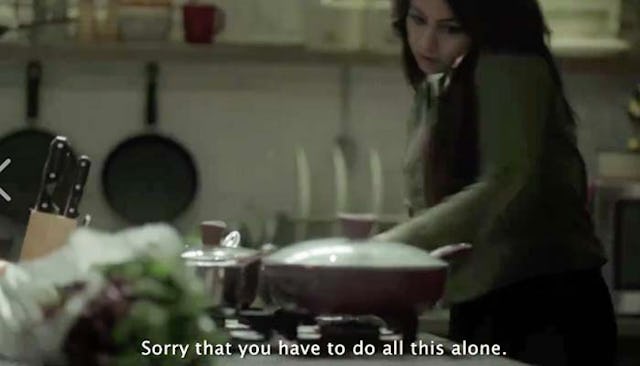Finally An Ad Tells The Truth About How Hard Moms Work, And How Unfair It Is

All over the world, women are constantly doing work they are not getting paid for.
Do you ever stop to really examine the dynamics of your household, and wonder how your roles fell into place? If you come from a family where the cooking, cleaning, and tending of the house defaulted to your mother, how much do you think seeing her in her “role” affected you as you grew into your own woman, managing your own home?
That’s the question the new Ariel laundry ad poses, from the perspective of a grandfather watching his daughter run around the house, tirelessly completing all tasks while her husband watches TV. He reflects on his own role in molding certain stereotypes for his daughter — and seems to feel very, very sorry about it. Sheryl Sandberg shared the video on her Facebook page and called it “one of the most powerful videos” she had ever seen.
“This is one of the most powerful videos I have ever seen” writes Sandberg. “When little girls and boys play house they model their parents’ behavior; this doesn’t just impact their childhood games, it shapes their long-term dreams.”
Many people share the load in their homes, the image of a man watching TV while his wife circles around him certainly doesn’t apply to everyone. But if you come from a culture that is still deeply rooted in traditional gender roles, this video is not far-fetched at all. I’m first generation Italian on my father’s side and first generation Greek on my mother’s side. Even in modern Greek and Italian-American homes, these roles stick — moms do the cooking and cleaning, even if they are working outside the home, too. My mother worked full time as a waitress when I was a child, and still did all the laundry, preparing of meals, and housework.
And even if you don’t come from that type of background , you may think we’ve come a lot farther than we actually have.
All over the world, women are constantly doing work they are not getting paid for. “Unless things change, girls today will spend hundreds of thousands more hours than boys doing unpaid work simply because society assumes it’s their responsibility,” writes Melinda Gates in the yearly letter she and her husband Bill Gates write outlining their philanthropic priorities. This year, she devoted her portion of the letter to the enormous burden of unpaid work that rests on the shoulders of women everywhere: the cooking, the cleaning, the laundry — the handling of all the minute details that keep a household running. “Now, this work has to be done by somebody. But it’s overwhelmingly women who are expected to do it, for free, whether they want to or not,” says Gates.
Research from OECD proves that in every part of the world, women spend more time on unpaid work than men do: an average of 4.5 hours a day. Men spend less than half that time. “What amazing goals would you accomplish with an extra hour every day? There are lots of ways to answer this question, but it’s obvious that many women would spend more time doing paid work, starting businesses, or otherwise contributing to the economic well-being of societies around the world. The fact that they can’t holds their families and communities back.”
This is a way bigger issue than just some dishes. Or some laundry. Or a clean house. It’s a mode of thinking that’s holding our daughters back. “Playing house” isn’t that benign after all, unless we’re teaching our sons to do it, too.
This article was originally published on